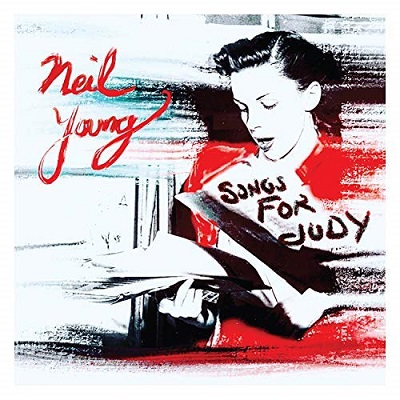If you follow Neil Young’s career with an ear for history, it seems like the mid 1970s was when the singer, songwriter, guitarist and activist really started to assert his might. Long after his sophomoric high jinks in Buffalo Springfield and away from his on again/off again affair with Crosby, Still & Nash, Young kept the light on with Crazy Horse when he wanted to cut loose. He also had (and continues to have) the luxury of going it alone with nothing but an acoustic, a harmonica, a chair, a microphone, maybe a piano or pump organ to the side, and a percolating, pleasing demeanor that reveals itself in the intimacy. Such is the case with Songs For Judy.
A 22-song collection from Young’s November 1976 solo acoustic tour of the States, Songs For Judy isn’t just another Archive release; it’s the first release from the musician’s Reprise Records imprint, Shakey Pictures Records. It was put together by director and former rock journalist Cameron Crowe and producer, photographer, former guitar technician Joel Bernstein. As concerned onlookers, their comments and observations fill the CD booklet’s pages. What’s most interesting is how Bernstein’s cassette recordings of the tour were sourced alongside Tim Mulligan’s original PA board mix to fill the docket. It adds to the organic mystique that Young entertained at the time.
Right out of the gate, Young is dissing his past. “I love it when you ask me for those old songs,” he says, responding to hard-to-hear requests, “You know, it’s funny, because what keeps you alive can sometimes kill you. Too much of the old shit and good night…” And the crowd cheers him on, commending his honesty. There’s no denying Neil Young’s honesty. Then as it is now. He announces a song he says he wrote for the “loud, boisterous mothers out there.” There are a few more observations about the venue, the pit and a supposed vision of Judy Garland in a red dress, and then he falls into “Too Far Gone,” which Young says is “about himself.” What’s really funny is that this self-confessional tome wouldn’t show up on any Neil Young album until 1989’s Freedom. Maybe it was just too close to home because the woozy, diluted, at times celebratory tone here is filled with raw emotion and surrender.
Young wasn’t about to leave the building without pulling out nuggets from his ever-growing catalog, and that includes numbers from his distant past, like a spunky take of Buffalo Springfield’s “Mr. Soul,” or the spirited run through of “The Old Laughing Lady” from Young’s 1969 self-titled solo debut. And he certainly wasn’t going to leave out songs from Harvest, to date his most successful album. The title track, “Heart Of Gold,” “A Man Needs A Maid,” and “The Needle And The Damage Done,” drawing an unusually upbeat ovation, made the cut on Songs For Judy.
As he’s known to do, Young wanders off the path occasionally and churns out something as innocent as a heartfelt “The Losing End,” assuming a significantly different glow than the country-flavored original he recorded with Crazy Horse on 1969’s Everybody Knows This Is Nowhere. “No One Seems To Know,” a live staple but never available on any Young’s official albums, makes its first appearance here. The performance, captured on November 7, 1976 in Boulder, Colorado, is one of many that highlights Young’s unique sensibility on the keys. Once he sits behind the piano and brashly strokes out the opening notes on “After The Gold Rush” and “Journey Through The Past,” everyone pretty much falls to their knees and the show morphs into a religious experience.
Of course, Songs For Judy isn’t without its politics. Young dedicates “Here We Are In The Years,” to the “new president,” who was the just-elected Jimmy Carter, and extends an olive branch to Richard Nixon on “Campaigner,” which he premiered just months before with Stills-Young Band. Things have changed since then. And then the CD winds down with two of Young’s more riveting songs. On “Pocahontas”, the list of shout-outs extends beyond Marlon Brando, Pocahontas and Young, to Ann-Margaret, Muhammad Ali, John Ehrlichman, and the first family. Then Young calls out, “Come on up here Judy,” before strumming the radiant chords of “Sugar Mountain.” No matter how tumultuous it can get, this song’s calming effect never fails to break through. For Judy, and anyone else with a beating heart and a little bit of soul.




















